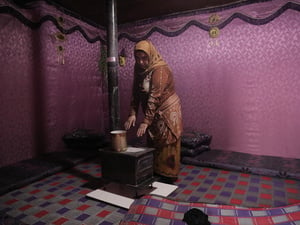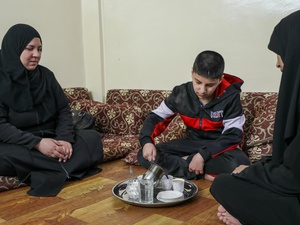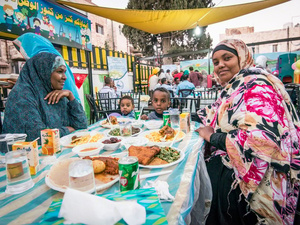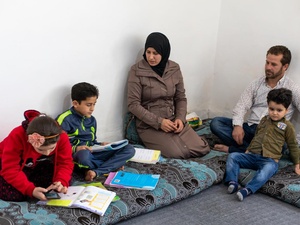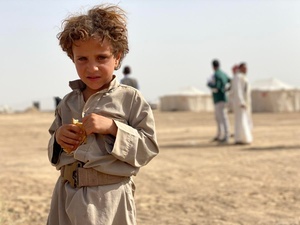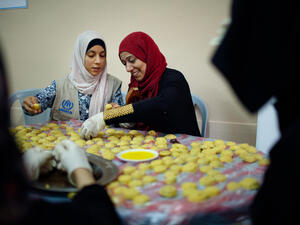UNHCR Jordan serves a community under canvas during Ramadan
UNHCR Jordan serves a community under canvas during Ramadan

Moments before the sunset call to prayer, refugees in Jordan patiently wait to break their daily fast.
AMMAN, Jordan, September 17 (UNHCR) - Each day at sunset in the Jordanian capital this month, 200 needy people have been gathering in a UNHCR tent for the iftar meal that ends the daily fast during the Islamic month of Ramadan.
As well as offering assistance to refugees, asylum-seekers and locals, the iftar tent, now in its third year of operation, provides often isolated individuals with a place to socialize. "I have not heard from my family in more than four years," says Mohammed,* a 27-year-old Darfurian refugee from Sudan. "Iftar gatherings like this make me feel like I am spending time with family."
During Ramadan, Muslims traditionally fast during daylight hours in a gesture of solidarity with the underprivileged. Since 2007, UNHCR Jordan has initiated a number of activities during the fasting period to provide meals, financial assistance and toys to economically vulnerable refugees. This year, in line with UN High Commissioner for Refugees António Guterres' "Ramadan Solidarity Initiative," the refugee agency's Jordan office has stepped up its efforts.
"The refugees we serve are needy and exiled," said Arafat Jamal, UNHCR's deputy representative in Jordan. "The extra cash we grant them during Ramadan provides additional support to the vulnerable, while the iftar dinners help bring together communities in a convivial environment."
In cooperation with the Jordanian charitable organization, Tikeyet Um Ali, UNHCR sponsored an iftar tent in an area of Amman with the highest concentration of Iraqi refugees in the country. At sunset, daily iftar meals are distributed to those in need.
Another initiative, in conjunction with CARE, provided meals at a restaurant in Amman to nearly 600 refugees and asylum-seekers. Sweets were distributed to some 250 families, and children provided with toys ahead of Monday's Eid-al-Fitr celebration, which marks the end of Ramadan.
"The Ramadan tent is excellent. I hope UNHCR will continue to provide this service," said Mustafa,* a refugee from Baghdad. "It has given me an opportunity to bond with friends."
The UNHCR is also providing vulnerable refugee families on financial assistance with an Eid bonus of 50 Jordanian dinars (US$70). Some 5,000 families will benefit from the scheme. Four thousand kilogrammes of dates, traditionally eaten to break the fast, were also distributed at community centres.
"Direct financial assistance for vulnerable refugees has been the backbone of the Jordan operation since early 2008," said Jamal. "As the country enters into a festive period with the end of Ramadan, we wanted to ensure that refugees were not left out, and had a fair chance of providing their children with an Eid holiday."
* Names changed for protection purposes
By Ziad Ayad and Dana Bajjali in Amman, Jordan


